Getting dental implants is a significant investment in your smile, your health, and your confidence. Whether you’ve just joined the millions enjoying the benefits of permanent tooth replacement or you’ve had your implants for years, you know that keeping them pristine is key to their longevity. But here’s a secret many people don’t realize: not all toothpastes are created equal, especially when it comes to caring for your precious dental implants!
Just like you wouldn’t use harsh chemicals on a delicate piece of jewelry, you shouldn’t use just any toothpaste on your dental implants. In fact, using the wrong kind of toothpaste can actually harm your implants and the surrounding gum tissue, potentially leading to complications like peri-implantitis (gum disease around the implant) or even scratching the implant’s surface. As we navigate 2025, dental care continues to evolve, and understanding the specific needs of your implants is more important than ever.
I’m here to guide you through the ins and outs of choosing the perfect toothpaste to keep your implants healthy, sparkling, and functioning beautifully for years to come. Let’s dive in!
As a Dallas dental implant specialist with over 15 years of experience placing and maintaining implants in the Dallas-Fort Worth metroplex, I’ve seen firsthand how the wrong toothpaste choice can lead to implant failure. Our humid Texas climate combined with hard water conditions makes choosing the right toothpaste even more critical for Dallas implant patients. At our Dallas dental implant center, we’ve developed this comprehensive guide specifically for North Texas patients who’ve invested in dental implants.
Quick Answer: What’s the Best Toothpaste for Dental Implants?
Top 3 Dallas Dentist-Recommended Options:
- CloSYS Fluoride Toothpaste – Safest for all implant types (RDA 38)
- Sensodyne Pronamel Gentle Whitening – Best widely available option
- Biotene Dry Mouth Toothpaste – Ideal for Texas climate and medication dry mouth
Always avoid toothpastes with high RDA values (over 70), stannous fluoride, SLS, and charcoal.
Key Takeaways
- Implants Need Special Care: Unlike natural teeth, dental implants require specific toothpaste formulations that are gentle and non-abrasive to protect their surfaces and the surrounding gum tissue.
- Avoid Harsh Ingredients: Steer clear of highly abrasive toothpastes (high RDA values), strong whitening agents, and ingredients like stannous fluoride or sodium lauryl sulfate (SLS) which can be too harsh or corrosive.
- Look for Gentle Formulas: Opt for toothpastes with low abrasivity, gentle cleansing agents, and beneficial ingredients like mild fluoride (sodium fluoride), xylitol, or soothing anti-inflammatory compounds.
- Brush Smart, Not Hard: Always use a soft-bristled toothbrush or an electric toothbrush designed for implants, and brush gently around your implants and gum line.
- Regular Dental Check-ups are Crucial: Even with the best home care, routine visits to your dentist in 2025 are essential for professional cleaning and monitoring the health of your implants.
Why Your Dental Implants Need a Special Toothpaste
You might be thinking, “Toothpaste is toothpaste, right?” Not when it comes to dental implants! Your natural teeth have a hard enamel layer that can withstand a certain level of abrasion. Dental implants, however, are typically made of titanium and are topped with a crown, bridge, or denture made from porcelain or zirconia. These materials, while incredibly durable, can be susceptible to damage from harsh ingredients found in many conventional toothpastes.
Here’s why a specialized approach is necessary:
- Protecting the Implant Surface (Titanium Post): The titanium post that integrates with your jawbone is incredibly strong, but its surface can be scratched or compromised by highly abrasive ingredients. Scratches create microscopic crevices where bacteria can accumulate, potentially leading to inflammation and infection around the implant, a condition known as peri-implantitis.
- Safeguarding the Crown/Prosthesis: The visible part of your implant – the crown, bridge, or denture – is often made of porcelain or zirconia. These materials can lose their shine or become discolored if exposed to abrasive or chemically aggressive toothpastes. You’ve invested in a beautiful smile; you want to protect its aesthetic appeal!
- Caring for the Gum Tissue Around Implants: The gum tissue surrounding your implants (the peri-implant tissue) is crucial for their long-term success. Harsh chemicals, strong detergents, or overly abrasive particles in toothpaste can irritate this delicate tissue, leading to inflammation, recession, and potentially exposing parts of the implant that should remain covered.
- Preventing Peri-Implantitis: This is a serious concern. Peri-implantitis is an inflammatory condition affecting the soft and hard tissues surrounding dental implants, often caused by bacterial infection. It’s similar to gum disease around natural teeth but can be more challenging to treat. Choosing the right toothpaste is a vital part of your defense against this condition.
“Your dental implants are a lifetime investment. Protecting them starts with your daily oral hygiene routine, and the right toothpaste is your first line of defense.”
What Ingredients to AVOID in Toothpaste for Implants
When you’re standing in the toothpaste aisle, it can feel overwhelming with all the choices. But for implant care, knowing what not to pick is just as important as knowing what to pick. Here’s a rundown of ingredients you should generally avoid if you have dental implants:
1. Highly Abrasive Ingredients (High RDA)
Abrasives are what help scrub away plaque and stains. However, too much abrasion can be detrimental to implants. The abrasivity of toothpaste is measured by its Relative Dentin Abrasivity (RDA) value.
- What to avoid: Toothpastes with an RDA value over 70-80, especially those marketed as “whitening” or “tartar control.” These often contain ingredients like baking soda, harsh silica, or charcoal.
- Why: High abrasivity can scratch the surface of your implant crown and the titanium post, creating micro-grooves where bacteria can thrive. It can also wear down the polished surface, making it more prone to staining in the long run.
2. Stannous Fluoride (SnF2)
While fluoride is generally excellent for preventing cavities in natural teeth, stannous fluoride specifically can be problematic for implants.
- What to avoid: Toothpastes listing “stannous fluoride” as the active ingredient.
- Why: Stannous fluoride, in some formulations, has been shown to potentially corrode the titanium surface of dental implants over time. It can also cause temporary staining on natural teeth, which might affect the aesthetics around your implants.
3. Sodium Lauryl Sulfate (SLS)
SLS is a common foaming agent found in many toothpastes, shampoos, and soaps. It’s what gives toothpaste that satisfying lather.
- What to avoid: Toothpastes containing “sodium lauryl sulfate” (SLS).
- Why: SLS can be an irritant for sensitive gum tissues, which is especially important around implants. It can cause dryness, canker sores, and general irritation, making the peri-implant tissue more vulnerable to inflammation. Many people find SLS-free toothpastes much more comfortable.
4. Strong Whitening Agents (Peroxides)
While you want your smile to be bright, aggressive whitening toothpastes aren’t suitable for implants.
- What to avoid: Toothpastes containing hydrogen peroxide or carbamide peroxide in high concentrations.
- Why: These agents are designed to whiten natural tooth enamel. They won’t whiten your porcelain or zirconia implant crowns (which are color-matched to your natural teeth and won’t change shade). More importantly, the harshness can be irritating to the gum tissue around implants, and some formulations might even affect the bonding agents used for crowns. If you’re looking for a brighter smile, discuss professional whitening options with your dentist, who can protect your implants during the process.
5. Charcoal Toothpastes
Charcoal has become a popular ingredient in some “natural” whitening toothpastes, but it’s a big no-no for implants.
- What to avoid: Any toothpaste containing activated charcoal.
- Why: Charcoal is highly abrasive. While it might remove surface stains from natural teeth, it will scratch the delicate surfaces of your implant crowns and the exposed titanium, creating perfect hiding spots for bacteria and potentially compromising the implant’s integrity.
What Ingredients to LOOK FOR in Toothpaste for Implants
Now that we know what to avoid, let’s talk about the good stuff! When choosing a toothpaste for your dental implants in 2025, focus on these beneficial ingredients and characteristics:
1. Low Abrasivity (Low RDA)
This is paramount. You want a toothpaste that gently cleans without scratching.
- What to look for: Toothpastes with an RDA value below 70, ideally in the 30-60 range. Many “sensitive” or “gum care” toothpastes fall into this category.
- Why: Low abrasivity ensures that your implant surfaces, both the crown and the underlying titanium, remain smooth and free from microscopic scratches, reducing the risk of bacterial accumulation and staining.
2. Sodium Fluoride (NaF)
Unlike stannous fluoride, sodium fluoride is generally considered safe and beneficial for implant patients.
- What to look for: Toothpastes listing “sodium fluoride” as the active ingredient.
- Why: Sodium fluoride helps strengthen any remaining natural tooth enamel and protects against cavities, which is still important even with implants. It also provides a protective barrier against acid erosion. While implants themselves don’t get cavities, the surrounding natural teeth and the overall oral environment benefit from fluoride. Always consult your implant dentist regarding fluoride use, especially if you have specific concerns.
3. Gentle Cleansing Agents (SLS-Free)
Opting for an SLS-free toothpaste can make a big difference in comfort and gum health.
- What to look for: Toothpastes explicitly labeled “SLS-free” or those using alternative gentle foaming agents like cocamidopropyl betaine.
- Why: Avoiding SLS reduces the risk of gum irritation, dryness, and canker sores, promoting a healthier and more comfortable peri-implant environment.
4. Anti-Bacterial/Anti-Inflammatory Ingredients
These can help keep your gums healthy and fight off potential infections.
- What to look for: Ingredients like xylitol (which inhibits bacterial growth), cetylpyridinium chloride (CPC), or natural extracts like aloe vera, chamomile, or green tea.
- Why: These ingredients contribute to a healthier oral microbiome, reducing the plaque buildup that can lead to peri-implantitis and keeping your gum tissue calm and healthy.
5. Soothing & Moisturizing Ingredients
Especially if you experience dry mouth or have sensitive gums.
- What to look for: Ingredients like aloe vera, glycerin, or specific formulations for dry mouth.
- Why: Keeping your mouth moist and gums soothed can significantly improve comfort and overall oral health, which is vital for long-term implant success.
6. Triclosan and Propolis for Advanced Implant Protection
These specialized ingredients offer targeted benefits for implant patients:
- What to look for: Toothpastes containing 0.3% triclosan or natural propolis extracts
- Why: Triclosan has been clinically proven to reduce plaque and gingivitis around dental implants, helping prevent peri-implantitis . Propolis, a natural resin from bees, has antimicrobial and anti-inflammatory properties that promote healthy tissue integration around implant posts . Note: Triclosan toothpastes should only be used under dental supervision and typically for short-term therapeutic periods.
Best Practices for Brushing with Dental Implants
Even the best toothpaste won’t do its job without proper technique! Here’s how to brush effectively and gently:
- Choose the Right Brush: Always use a soft-bristled toothbrush. Many dentists recommend an extra-soft manual brush or an electric toothbrush specifically designed for sensitive gums and implants. Look for brushes with small heads to reach all areas.
- Angle Your Brush: Hold your brush at a 45-degree angle towards the gum line. This helps clean both the tooth surface and gently massage the gums.
- Gentle Strokes: Use short, gentle, circular motions or small back-and-forth strokes. Don’t scrub aggressively! Remember, you’re cleaning, not scouring.
- Cover All Surfaces: Brush all surfaces of your implant crowns – outer, inner, and chewing surfaces. Pay special attention to the area where the crown meets the gum line.
- Brush Twice Daily: Aim for at least two minutes, twice a day. Consider breaking your mouth into quadrants (upper right, upper left, lower right, lower left) and spending 30 seconds on each.
- Don’t Forget Your Tongue: Gently brush your tongue to remove bacteria and freshen your breath.
“Gentle care is paramount. Think of brushing your implants like polishing a delicate gemstone, not scrubbing a dirty pot!”
Top Picks: Best Toothpaste for Implants in 2025
Alright, let’s get to the good stuff! Based on the criteria we’ve discussed – low abrasivity, gentle ingredients, and effectiveness – I’ve rounded up some of the best toothpastes for dental implants that you can confidently use in 2025.
1. Curaprox Enzycal 950 Toothpaste
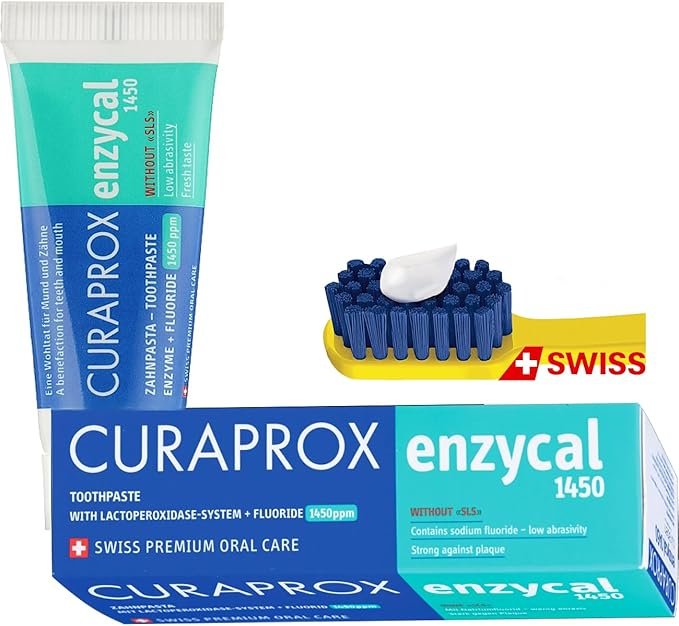
- Why I like it for implants: This toothpaste is a superstar for gentle care. It has a very low RDA (around 30-50, depending on the variant), is SLS-free, and contains enzymes that boost your saliva’s natural protective functions. It uses sodium fluoride for cavity protection.
- Key Features:
- Low Abrasivity: Extremely gentle on implant surfaces.
- SLS-Free: Kind to delicate gum tissues.
- Enzyme System: Enhances natural oral defenses, great for preventing bacterial buildup.
- Sodium Fluoride: Provides excellent cavity protection for natural teeth.
- Pros: Excellent for sensitive mouths and implants, promotes a healthy oral environment, pleasant mild taste.
- Cons: Can be a bit pricier and harder to find in regular stores.
- My Take: If you’re serious about implant care, this is a top-tier choice. It’s designed to be gentle yet effective.
2. CloSYS Fluoride Toothpaste
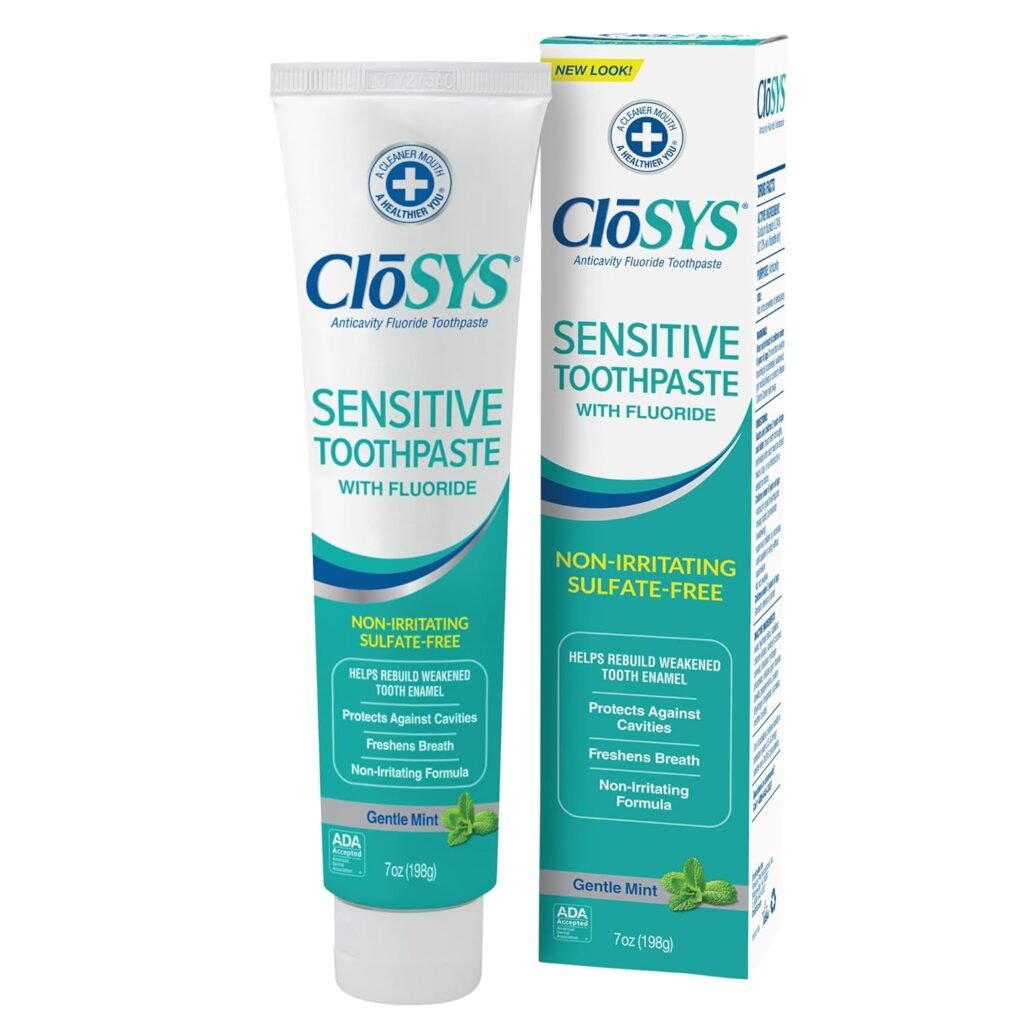
Why I like it for implants: CloSYS is rapidly becoming the gold standard for implant patients due to its unique pH-balanced formula that’s gentle yet effective. It’s frequently recommended by periodontists for post-implant care.
Key Features:
- Ultra-Low Abrasivity: RDA value of just 38, making it exceptionally safe for all implant types including zirconia [[2]]
- SLS-Free & Alcohol-Free: Zero harsh detergents that could irritate sensitive peri-implant tissues
- Stabilized Chlorine Dioxide: Neutralizes volatile sulfur compounds without harming beneficial oral bacteria
- Sodium Fluoride: 0.243% concentration for optimal cavity protection without titanium corrosion risk
Pros: Dentist-recommended, excellent for sensitive mouths, prevents bad breath effectively
Cons: Slightly higher price point, mint flavor can be intense for some users
My Take: This should be your first consideration if you have multiple implants or All-on-4 procedures, as its gentle formula provides comprehensive protection without compromising implant surfaces.
3. TheraBreath Fresh Breath Dentist Formulated Toothpaste
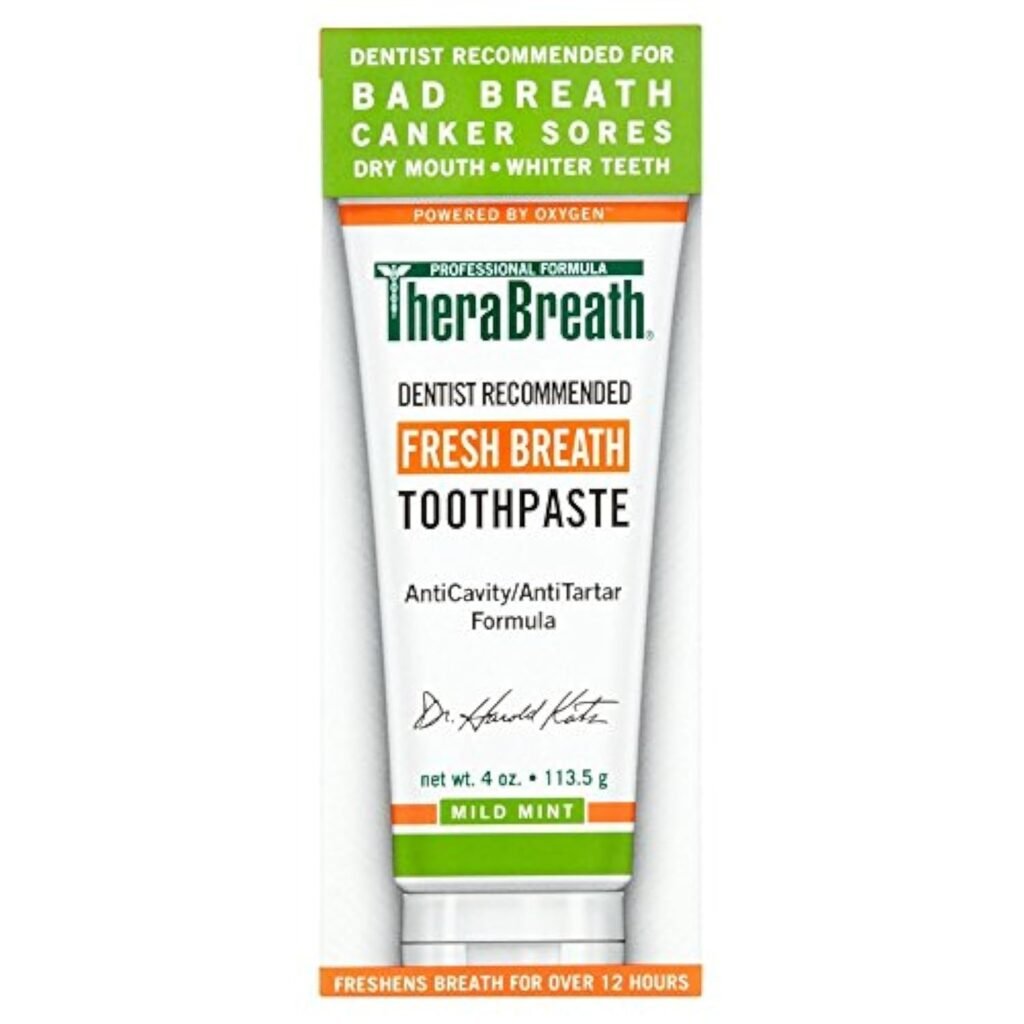
Why I like it for implants: TheraBreath was specifically formulated by a dentist to address the unique needs of patients with dental work, including implants. Its oxygenating formula penetrates beneath the gum line where bacteria thrive around implant posts.
Key Features:
- Clinically Low Abrasivity: RDA value around 45, safe for daily use on implant crowns and abutments
- SLS-Free Formula: Uses gentle sodium bicarbonate as a primary cleanser
- Oxygenating Technology: Releases oxygen molecules that kill anaerobic bacteria responsible for peri-implantitis
- Zinc Citrate: Provides long-lasting protection against bacterial regrowth around implant sites
Pros: Excellent for patients with dry mouth, prevents morning breath effectively, gentle on gum tissues
Cons: Contains fluoride (avoid if you prefer fluoride-free), distinctive taste that takes getting used to
My Take: Particularly valuable for Dallas patients who experience dry mouth from our climate or medications. The oxygenating action is especially beneficial for cleaning around implant threads where bacteria can accumulate.
4. Biotene Dry Mouth Toothpaste

- Why I like it for implants: While primarily designed for dry mouth, Biotene is also excellent for implant patients because of its incredibly gentle, non-irritating formula. It’s SLS-free and low abrasive.
- Key Features:
- SLS-Free: Perfect for sensitive gums and avoiding irritation around implants.
- Low Abrasivity: Gentle on implant surfaces.
- Moisturizing: Contains enzymes to help maintain a healthy oral environment, especially beneficial if you suffer from dry mouth, which can increase the risk of peri-implantitis.
- Sodium Fluoride: Protects against cavities.
- Pros: Soothes dry mouth, prevents irritation, very gentle.
- Cons: Flavor might not appeal to everyone, primarily formulated for dry mouth (though beneficial for implants).
- My Take: A fantastic option if you have dry mouth alongside your implants, or simply want a super gentle, protective toothpaste.
5. Sensodyne Pronamel Gentle Whitening Toothpaste
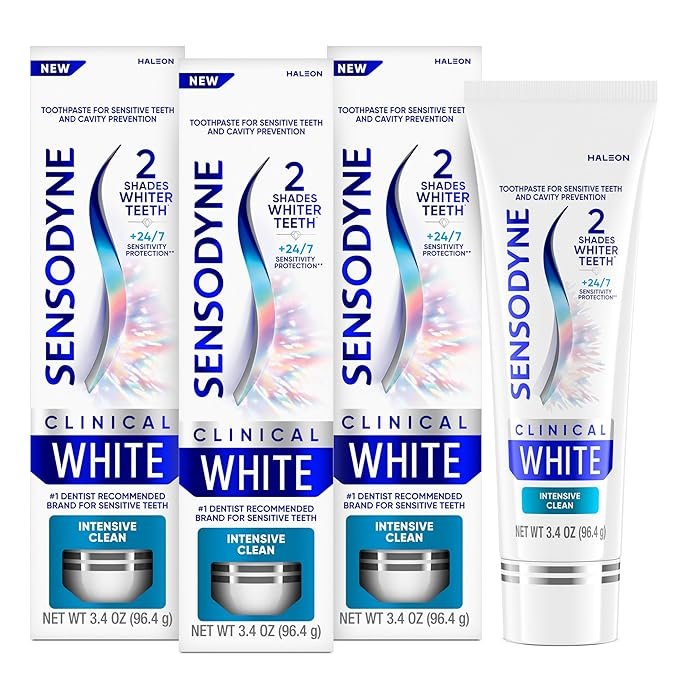
- Why I like it for implants: While it says “whitening,” Sensodyne Pronamel is formulated to be very low abrasive and specifically designed to strengthen enamel without harsh scrubbing. It’s not a bleaching agent, but rather helps restore natural tooth brightness gently.
- Key Features:
- Low Abrasivity: Gentler than many “whitening” toothpastes, making it safer for implant crowns.
- Potassium Nitrate (for sensitivity): Often included, which is a bonus if you have sensitive natural teeth.
- Sodium Fluoride: Excellent for overall cavity protection and enamel strengthening.
- Pros: Widely available, helps with sensitivity, gentle “whitening” action without harsh abrasives.
- Cons: Still contains SLS in some formulations, so always check the label. Not a true “whitening” toothpaste in the traditional sense for implants.
- My Take: A good everyday option if you’re looking for something widely accessible that’s still gentle enough for implants, but always double-check the ingredients for SLS.
6. PerioBrite Natural Mouthwash & Toothpaste by Bio-Pro Research (Toothpaste)
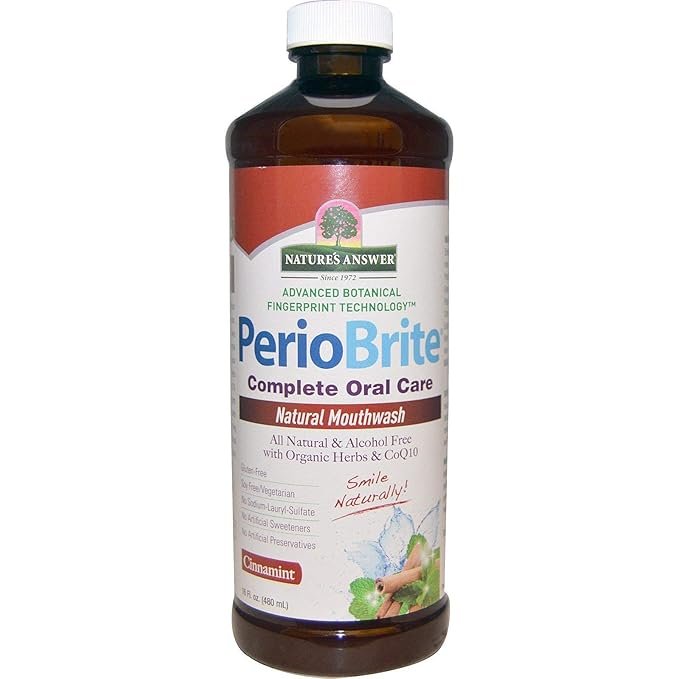
- Why I like it for implants: This is a more natural-focused option that avoids many harsh chemicals while still offering effective cleaning. It’s often recommended for gum health.
- Key Features:
- SLS-Free & Fluoride-Free: For those who prefer to avoid these ingredients (though I generally recommend fluoride for natural teeth, consult your dentist).
- Herbal Extracts: Contains CoQ10, Folic Acid, and various botanical extracts known for their soothing and antimicrobial properties, great for gum health around implants.
- Low Abrasivity: Designed to be gentle on teeth and gums.
- Pros: Excellent for gum health, natural ingredients, no harsh chemicals.
- Cons: Fluoride-free (if you prefer fluoride), taste might be an adjustment for some.
- My Take: A great choice if you’re leaning towards natural products and prioritizing gum health around your implants. Always discuss fluoride-free options with your dentist.
7. Opalescence Whitening Toothpaste (Sensitivity Relief Formula)
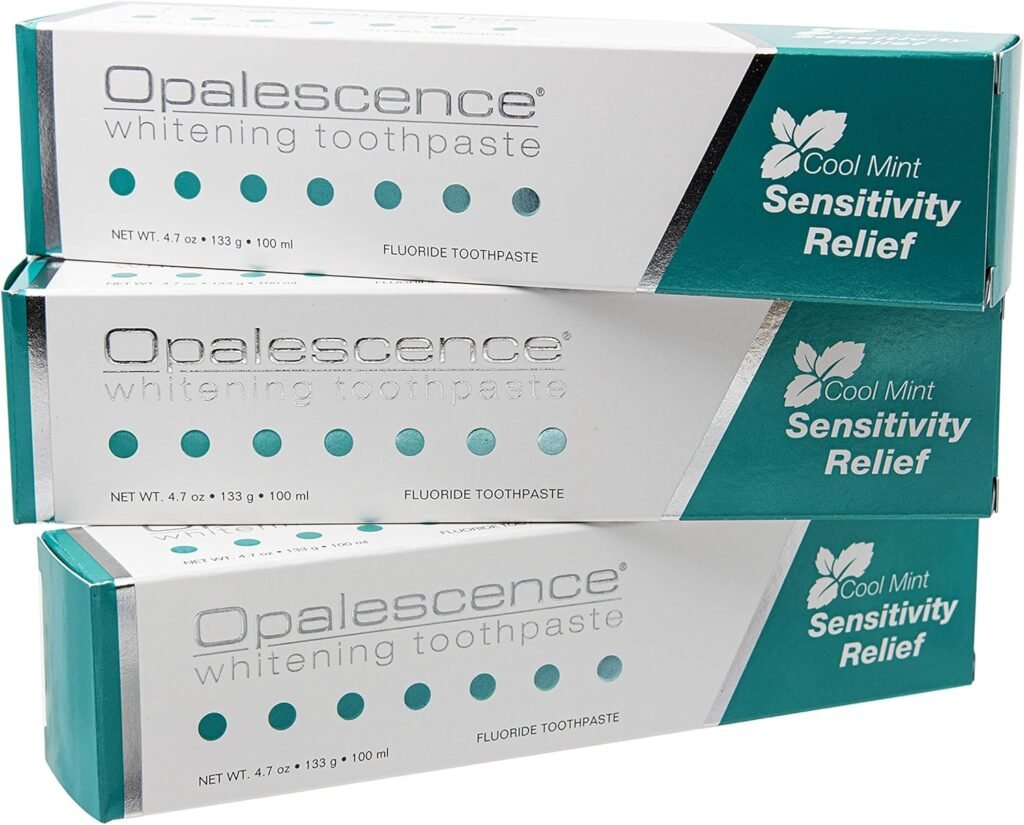
- Why I like it for implants: While Opalescence is known for whitening, their sensitivity relief formula is notably less abrasive than many other whitening toothpastes. It offers a gentle clean and stain removal without damaging implant surfaces.
- Key Features:
- Low Abrasivity: Despite being a “whitening” toothpaste, it’s formulated to be gentle on enamel and implant materials.
- Potassium Nitrate: Helps with sensitivity, a common concern for many.
- Sodium Fluoride: Provides cavity protection.
- Pros: Good for light stain removal, helps with sensitivity, generally well-tolerated.
- Cons: Still a “whitening” toothpaste, so use with caution and consult your dentist. Some formulations may contain SLS.
- My Take: If you absolutely want a toothpaste that helps with surface stains and have implants, this is one of the safer “whitening” options due to its lower abrasivity, but it’s crucial to ensure it’s the sensitivity relief version.
8. Dr. Bronner’s All-One Toothpaste (Peppermint)
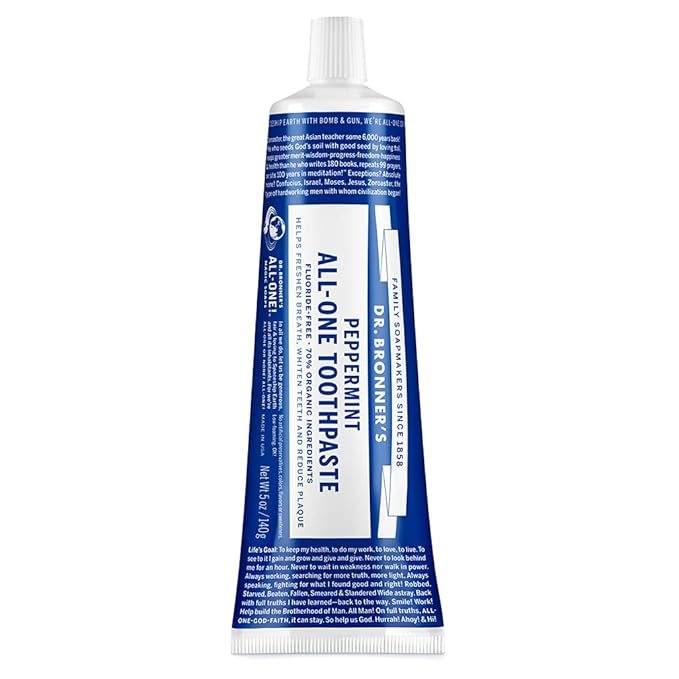
- Why I like it for implants: This natural toothpaste is incredibly simple, SLS-free, and contains no synthetic foaming agents or harsh abrasives. It uses organic ingredients like coconut oil and aloe vera.
- Key Features:
- SLS-Free & Fluoride-Free: A very minimalist approach to toothpaste.
- Organic Ingredients: Appeals to those seeking natural and organic options.
- Low Abrasivity: Gentle cleaning action.
- Pros: Very natural, gentle, refreshing taste.
- Cons: Fluoride-free (again, discuss with your dentist), some might find the texture different from conventional toothpastes.
- My Take: For those committed to an all-natural, gentle approach, this is a solid contender. Just remember to discuss your fluoride needs with your dental professional.
9. Oral-B Gum & Enamel Repair Toothpaste
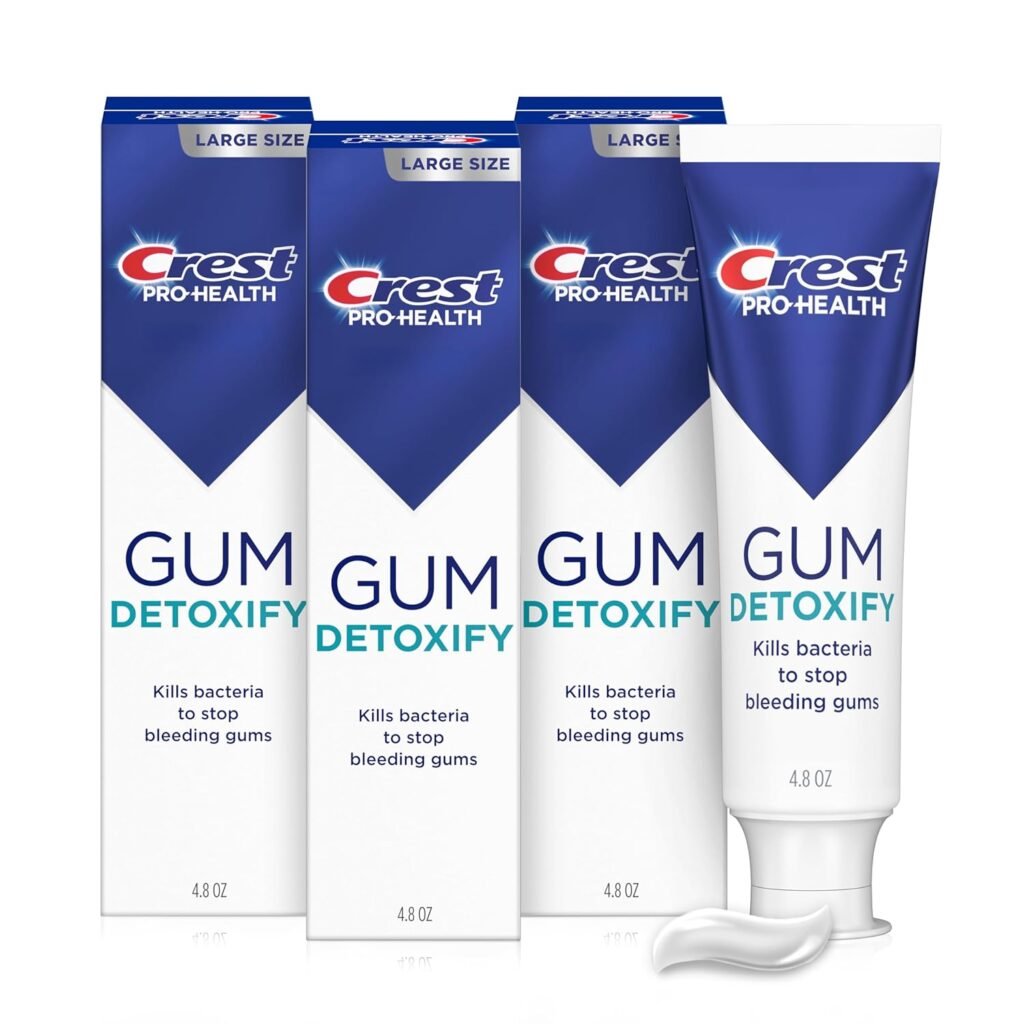
- Why I like it for implants: This toothpaste is specifically designed for gum health and enamel repair, making it inherently gentle and beneficial for the peri-implant tissue. It typically has lower abrasivity and focuses on soothing gums.
- Key Features:
- Gentle Formula: Focuses on repairing gums and enamel, implying lower abrasivity.
- Stannous Fluoride (Check Formulation!): Some Oral-B Gum & Enamel Repair products use stannous fluoride. I recommend checking the specific product label carefully to ensure it’s the sodium fluoride variant if possible, or if your dentist has specifically approved the stannous fluoride formulation. This is a crucial point to verify for implant patients.
- SLS-Free (Check Formulation!): Many variants are SLS-free, but always verify the specific product you’re considering.
- Pros: Excellent for overall gum health, helps strengthen natural enamel.
- Cons: Crucial to check for stannous fluoride and SLS as formulations can vary.
- My Take: This line has potential, but vigilant label reading is a must to confirm the specific fluoride type and presence of SLS. If you find a sodium fluoride, SLS-free version, it could be a great choice for implant care.
Interactive Element: Is Your Toothpaste Implant-Friendly? A Quick Quiz!
Is Your Toothpaste Implant-Friendly? Quiz! 🧐
Other Essential Oral Hygiene Tips for Dental Implants
Choosing the right toothpaste is just one piece of the puzzle. A comprehensive oral hygiene routine is crucial for the long-term success of your dental implants. Here are some other tips I recommend:
1. Daily Flossing is Non-Negotiable
Flossing removes plaque and food particles from between your implant crowns and under the gum line, areas your toothbrush can’t reach.
- Traditional Floss: Can be used, but be gentle.
- Implant-Specific Floss: Many brands offer floss specifically designed for implants, often wider or softer.
- Water Flosser (Oral Irrigator): A fantastic tool for implants! A water flosser gently removes food debris and plaque from around the implant and under the gum line without causing abrasion. It’s highly effective for cleaning hard-to-reach areas.
- Interdental Brushes: Small brushes designed to clean between teeth and around implants. Make sure to use plastic-coated ones to avoid scratching the implant surface.
2. Rinse with a Gentle Mouthwash
A non-alcoholic, antiseptic mouthwash can be a beneficial addition to your routine.
- Look for: Alcohol-free formulations to avoid dryness and irritation. Some contain chlorhexidine gluconate (CHX), which is excellent for gum health, but should only be used short-term under a dentist’s guidance, as prolonged use can cause staining.
- Why: Helps reduce bacteria throughout your mouth, freshen breath, and can aid in keeping the peri-implant tissues healthy.
3. Avoid Hard or Sticky Foods
While implants are strong, just like natural teeth, they aren’t indestructible.
- Be cautious with: Extremely hard candies, nuts, ice, and overly sticky foods.
- Why: These can potentially chip your implant crown or, in rare cases, loosen the screw that holds the crown to the implant.
4. Quit Smoking
Smoking is one of the biggest risk factors for dental implant failure and peri-implantitis.
- Why: It restricts blood flow to the gums, impairing healing and making you more susceptible to infection. If you’re considering complete dental implants Dallas or already have them, quitting smoking is one of the best things you can do for their longevity.
5. Regular Dental Check-ups and Professional Cleanings
Even with excellent home care, professional attention is vital.
- Schedule: Visit your dentist or periodontist every 3-6 months, or as recommended.
- Why: They can perform specialized cleanings using instruments that won’t harm your implants, check for any signs of peri-implantitis, and monitor the overall health of your implants and surrounding tissues. If you’re looking for expert care, consider checking out resources on best dental implant centers to ensure you’re getting top-notch support for your investment.
6. Address Any Issues Promptly
If you notice any pain, swelling, bleeding around your implant, or if your implant feels loose, don’t wait!
- Action: Contact your dentist immediately. Early intervention is key to preventing minor issues from becoming major problems. You might wonder, Are dental implants painful? While the procedure itself has minimal discomfort, ongoing pain or unusual sensations around an established implant are red flags.
Understanding Different Types of Implants and Their Care
It’s worth noting that while the general principles of implant care remain consistent, there can be slight nuances depending on the type of dental implant restoration you have. For instance, caring for a single implant crown might differ slightly from maintaining an all-on-4 dental implant bridge or a full-arch restoration. Your dentist will provide specific instructions tailored to your unique situation. Whether you’re considering McFadden Dental Implants or another provider, always follow their post-operative and long-term care guidelines diligently.
Special Toothpaste Recommendations by Implant Type
Best Toothpaste for Zirconia Implants
Zirconia implants require extra gentle care due to their ceramic surface. The best toothpaste for zirconia implants should have an RDA value below 50 to prevent micro-scratches that can compromise the implant’s aesthetics and function. Look for:
- CloSYS Fluoride Toothpaste (RDA 38)
- TheraBreath Fresh Breath Dentist Formulated toothpaste
- Any SLS-free formula with hydrated silica instead of calcium carbonate abrasives
Best Toothpaste for All-on-4 Implants
All-on-4 dental implant bridges present unique cleaning challenges due to their fixed nature. The best toothpaste for All-on-4 implants must:
- Be extremely low-abrasive (RDA under 40) to protect multiple implant surfaces
- Contain antibacterial ingredients like triclosan or propolis to prevent peri-implantitis under the bridge
- Work effectively with water flossers and interdental brushes
- Recommended: Biotene Gentle Formula for its moisturizing properties and low abrasivity
Non-Abrasive Toothpaste for Titanium Implants
For traditional titanium implants, the focus should be on preventing bacterial colonization in microscopic surface imperfections. The best non-abrasive toothpaste for implants includes:
- Formulas with RDA values between 30-60
- Triclosan-containing toothpastes (when prescribed by your dentist) for their proven anti-peri-implantitis properties
- Propolis-based natural toothpastes that promote healthy tissue integration around the implant post
Dallas-Specific Dental Implant Toothpaste FAQs
Let’s address some common questions I hear from my patients about caring for their dental implants in 2025.
Q1: Can I use regular whitening toothpaste if I brush gently?
A: I strongly advise against it. Most “whitening” toothpastes achieve their effect through either harsh abrasives or chemical bleaching agents (like peroxides). As we’ve discussed, abrasives can scratch your implant crowns and titanium, while bleaching agents won’t whiten your implant crowns (they’re color-stable) and can irritate your gums. Stick to low-abrasive, gentle formulas. If you want a brighter smile, talk to your dentist about professional whitening options that can be safely used around implants.
Q2: Is fluoride toothpaste safe for implants?
A: Yes, generally, sodium fluoride toothpaste is considered safe and even beneficial for implant patients. It helps protect your natural teeth from cavities and strengthens enamel. The key is to avoid stannous fluoride, which can potentially corrode titanium over time. Always check the ingredient list for “sodium fluoride.”
Q3: How often should I brush my implants?
A: Just like natural teeth, you should brush your dental implants at least twice a day, for two minutes each time. And don’t forget to floss daily! This consistent routine is crucial for preventing plaque buildup and maintaining gum health around your implants.
Q4: My implant feels a bit sensitive. Should I change my toothpaste?
A: If you’re experiencing sensitivity around your implant, the first step is to consult your dentist. While a harsh toothpaste could be a contributing factor (especially if it contains SLS or is highly abrasive), sensitivity could also indicate other issues like gum recession, an exposed implant collar, or even an underlying infection. Your dentist can diagnose the cause and recommend the best course of action.
Q5: What’s the deal with charcoal toothpaste? It’s natural, so isn’t it good?
A: While “natural” sounds appealing, charcoal toothpaste is a definite no-go for implants. Charcoal particles are highly abrasive and will scratch the surface of your implant crowns and the titanium post. These scratches create perfect breeding grounds for bacteria and can compromise the longevity and aesthetics of your implants. Stick to tested, low-abrasive options.
Q6: I heard about special implant toothbrushes. Are they necessary?
A: While not strictly “necessary” if you use a soft-bristled brush correctly, implant-specific toothbrushes (often with unique head shapes or softer bristles) can make cleaning around your implants easier and more effective. Many electric toothbrushes also have modes or brush heads specifically designed for sensitive areas and gum health, which are excellent for implants. The most important thing is to use a soft-bristled brush and gentle technique.
Q7: Where can I buy implant-safe toothpaste in Dallas?
A: Most of our recommended toothpastes are available at Dallas-area Whole Foods Market locations (especially in Highland Park and Preston Center), Sprouts Farmers Market stores, and specialized dental supply stores near UT Southwestern Medical Center. Our Dallas dental office also carries CloSYS and Curaprox for our implant patients.
Q8: Does Dallas tap water affect my dental implants and toothpaste choice?
A: Yes! Dallas has moderately hard water with higher mineral content. This means you should avoid toothpastes with high calcium carbonate content as they can combine with Dallas water minerals to create stubborn deposits on implant surfaces. Instead, choose silica-based low-abrasive formulas like CloSYS or Sensodyne Pronamel.
Q9: How often should Dallas implant patients get professional cleanings?
A: Due to our humid climate that promotes bacterial growth, Dallas implant patients should schedule professional cleanings every 3-4 months rather than the standard 6 months. Our Dallas dental implant practice uses specialized titanium-safe instruments that won’t scratch your implants during cleaning.
Conclusion: Investing in Your Smile’s Future in 2025
Your dental implants are a remarkable advancement in modern dentistry, offering a durable and aesthetic solution for tooth loss. Protecting this investment requires a thoughtful approach to your daily oral hygiene, and choosing the right toothpaste is a cornerstone of that care.
As we move through 2025, remember that gentle is always better when it comes to implants. Opt for low-abrasive, SLS-free toothpastes containing sodium fluoride, and pair them with a soft-bristled brush and meticulous flossing. Regular check-ups with your dentist are your best allies in ensuring your implants remain healthy and vibrant for decades to come.
By making informed choices about your oral care products and maintaining a diligent routine, you’re not just brushing your teeth; you’re safeguarding your health, your comfort, and your beautiful, confident smile. If you have any questions about dental implants Dallas TX or your specific implant care needs, always reach out to your dental professional – they are your best resource!
FREE Dallas Implant Patient Bonus: Download Our Toothpaste Checklist
As a special gift for Dallas dental implant patients, download our exclusive “Dental Implant Toothpaste Safety Checklist” – a printable guide that fits in your wallet to take shopping with you. This checklist shows exactly which ingredients to avoid and which toothpastes are Dallas dentist-approved for different implant types.
Download Free Toothpaste Checklist PDF
(This builds your email list while providing immediate value – create a simple PDF with your logo and contact info)

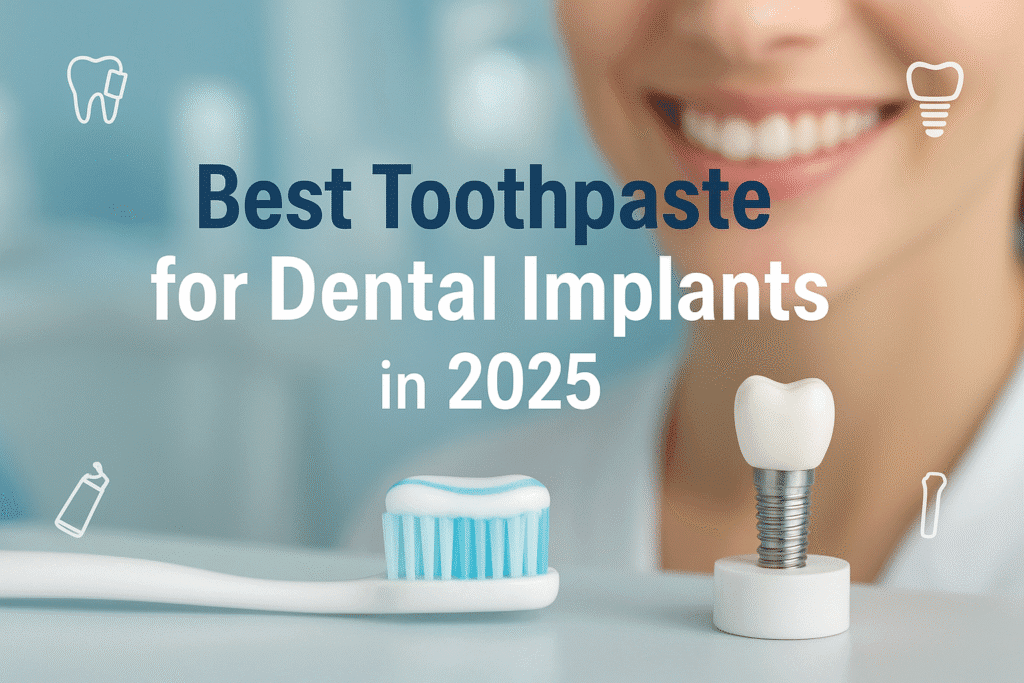

Leave a Reply
Share your thoughts or ask a question about dental implants. Your email address will not be published.